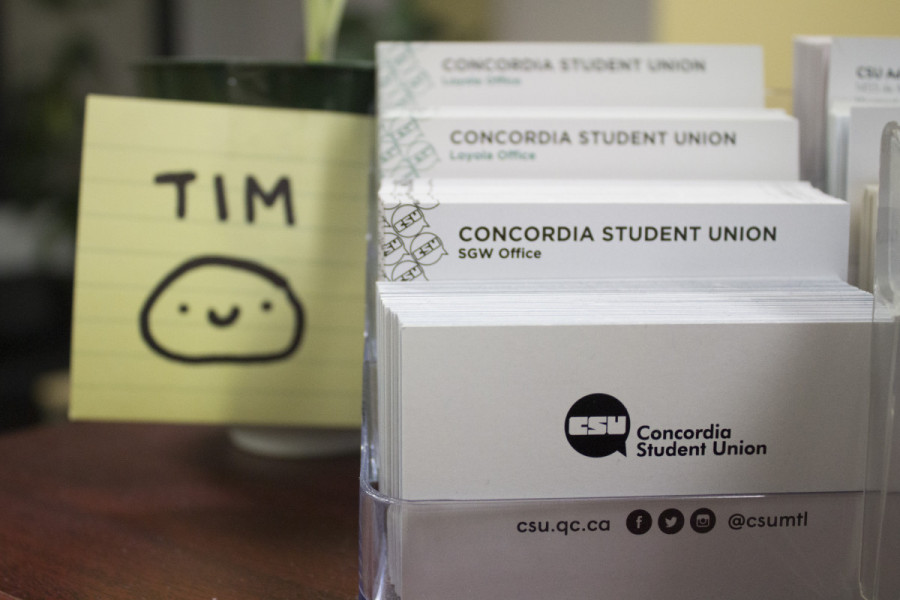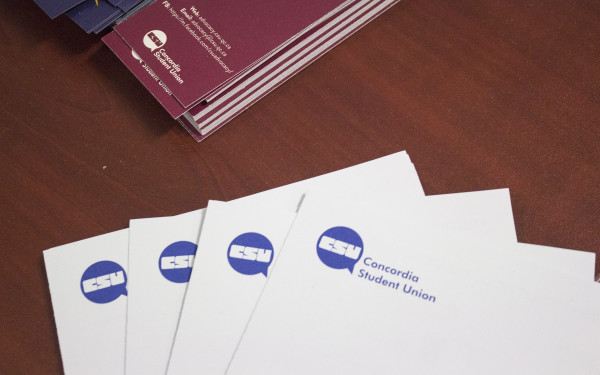Councillor Ahmadou Sakho resigns from CSU
Described it as an “arm-wrestle” to improve lack of diversity in the union
Ahmadou Sakho has resigned from the Concordia Student Union council effective Sept. 20, CSU chair Caitlin Robinson has confirmed.
Sakho sat on council for over a year before his resignation. He worked on passing measures concerning diversity training, amendments to bylaws regarding sexual violence, resolutions in the positions book, the Black Lives Matter campaign, a motion to improve BIPOC and other minorities’ representation in the CSU, and a new budget “despite the consistent pushback,” he said.
Sakho motivated for a seat on the policy committee, which was typically reserved for BIPOC, women, and gender minorities, which ultimately resulted in a new position being created for both himself and Danielle Vandolder-Beaudin, a former councillor.
Read more: Amidst tensions and resignations, another push for gender diversity emerges
In an interview with The Link, Sakho did not explicitly state whether a pattern of toxic behaviour was the cause for his resignation.
“I will say this: the long winded meetings on Zoom, the constant drama that does not come to fruition along with a four-hour time difference did not help,” Sakho said.
He described the past year as a “rollercoaster” and mentioned the work council and the executive managed to accomplish, but also cited some major points of turbulence, which he believes were aggravated by meetings being held on Zoom.
“Many councillors just stopped taking their role seriously and engaged in consistent ‘trolling’ during our Zoom meetings,” he said.
“I believe if the meetings were in person, considering people have a very different presence in the room, such a level of disrespect would not have happened.”
Sakho addressed the toxic environment cited by Paige Beaulieu when they also resigned earlier last month.
“People have been cursing in the meetings, deliberately offending people even after several warnings,” Sakho said. “In that sense it was very difficult to have an open debate.”
“I have seen other instances where people out of pure symbolism disregarded a valid discussion to bring the best alternative for students; the fee-levy motion that was voted on earlier this summer is an example of that,” he said.
While Sakho said he felt largely appreciated by those he worked with, he acknowledged there were pain points despite this, especially in matters concerning diversity.
“Every single time, it has been an arm-wrestle for people to implement measures to improve the lack of diversity at the CSU,” he said.
“We have eventually made big steps forward. I hope it lasts.”
Sakho said the system as it is is quite transparent, but the environment is toxic, which he claims, at this point, is common knowledge.
He said the Code of Conduct should be more enforceable to ensure there is more discipline and integrity on council. He also suggested more people coming to meetings and reading the minutes could also help hold people accountable.
When addressing claims about a racist environment at council, Sakho claimed he holds no grudges and the matter is personal, but he does not deny there are issues in terms of education on racial issues in council.
“I realized that some individuals really need to be educated on the subject and still see anti-racism as another chore or something forced upon them.”
Various CSU members see Sakho’s resignation as a huge loss for council. Councillor
Désirée Blizzard describes Sakho as “one of the best” they had.
“I realized that some individuals really need to be educated on the subject and still see anti-racism as another chore or something forced upon them.” —Ahmadou Sakho
“He’s calm and level-headed. He always spoke up when needed and kept the students first,” she said.
“Sakho has given a lot to the CSU to try and make it better,” said councillor S Shivaane.
“There were and are very few councillors who have put in that much time and dedication making the CSU a better place such as he did,” said General Coordinator Isaiah Joyner.
Joyner said Sakho’s resignation meant the loss of another significant voice advocating for diversity and inclusion on council.
“It worries me because even though we had such passionate voices such as him, myself, and other members of council speaking out to try and promote diversity to these very sensitive issues, we still see and hear people not getting the point and not taking the time to understand the systemic issues at play,” he said.
He hopes that, in the by-election, people who are more in-tuned with issues of racism and discrimination are elected to compensate for his loss.
Academic and Advocacy Coordinator Sarah Mazhero suggested that Sakho’s resignation is also a loss of the international-student perspective—Sakho is Senegalese.
“I’m upset that the environment became so hostile that there was no longer a justifiable enough reason to push through it,” said Shivaane. “I’m happy for him that he’s landed on this decision. I’m more so disappointed with council for refusing to see why disenfranchised people continue to resign due to continual disrespect.”
Shivaane, Mazhero, Blizzard, Joyner, and former CSU councillor Hannah Jamet-Lange all point to a toxic work environment on council for BIPOC students.
Jamet-Lange, who was on council from 2019 to 2020 mentioned that—even from her position as a white woman—she noticed certain microaggressions directed towards BIPOC students on council.
She explained an incident where Sakho and former councillor Elizabeth Tasong—who is also Black—spoke up about the proposed equitable hiring appointments policy and had their concerns dismissed. Their views and lived experiences were not taken seriously by the people who voted against the policy, said Jamet-Lange.
Blizzard said some councillors forget due process exists until it’s time to vote on progressive policies. There have been numerous instances where councillors would vote against policies—such as equitable hiring practices or making BLM the annual campaign—because of how they interpret due process. However, they then abandon those interpretations when it’s time to vote to give their friends on council a salary bonus, for example, she said.
Joyner said it’s possible that the lack of respect some councillors show to BIPOC issues and the BIPOC community can “take a toll on people.”
Both Shivaane and Mazhero pointed to an incident during the summer where council was appointing students to the policy committee.The appointments were being made using guidelines from a new diversity training motion — the guidelines of the motion were made to increase more BIPOC on council.
The appointments were being made using guidelines from a new diversity training motion — the guidelines of the motion were made to increase more BIPOC on council.
Shivaane, who presented the motion, said that even though the motion was made primarily with BIPOC in mind, she also included women in it.
Both Sakho and former councillor Vandolder-Beaudin nominated themselves to the policy committee seat. During motivations, former councillor Chirstopher Kalafatidis—Vandolder-Beaudin’s partner—advocated on Vandolder-Beaudin’s behalf.
According to Shivaane, he claimed that Vandolder-Beaudin was more suitable for the seat than Sakho because the committee was devoid of women—therefore implying that gender was a more important factor to consider than race.
“Comparing discriminations was the move for the now thankfully resigned councillors,” said Shivaane—referring to Kalafatidis and Vandolder-Beaudin, who both resigned in the summer.
Looking back at this incident, Shivaane remembers that Sakho was “understandably” visibly upset by it.
“I would say any Person of Colour on council is familiar with constant racial discrimination from councillors,” she said. “It’s disgusting.”






